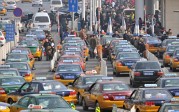
China Overview
- Population: 1.3 billion
- Currency: yuan
- Guinness World Records: most people painting each other's faces simultaneously in one location (13,413), largest bottle of cooking oil (containing 3212 litres), most couples hugging (3009 couples).
- Internet users: 135 million
- Milk beer: from Inner Mongolia, an alternative to the traditional mare's-milk wine.
- Squirrel fish: whole mandarin fish deep-fried and manipulated to resemble a squirrel.
- Number of chinese characters: over 56,000
Taxi in cities
 | The Chinese Taxi Industry spans throughout the whole Chinese nation, although is mainly concentrate in the cities. Each city has a different history for how its taxi industry developed. Even though each city has different industrial problems, the economical benefits from the different taxi trades are the same. As well as this, the social effects are the same and can be demonstrated though the same conflicts within the taxi industries, thus a nationwide report on the industry is produced. |
| How much do you know about Chinese taxis in the city? | |
Compared with their counterparts in other regions, taxi drivers in Chongqing, Hainan and Gansu province, are indeed lucky. In recent strikes launched by some taxi drivers in the three regions, they got a quick response from the local authorities and their problems resolved. The taxi drivers went on strike against rental fees and unlicensed competition, issues that have been plaguing them for some time. The drivers were given the opportunity to have their representatives speak about their complaints to top local officials. It was a rare opportunity. Their counterparts in other regions, facing similar problems, have not yet had their problems acknowledged. | |
First of all, would taxi drivers still choose to take to the streets if they had a good channel to express their grievances to the relevant departments? The answer is no. "The long-standing conflicts over management systems, industry guidance, and the distribution of profit have led to a shaky environment for the entire industry and its employees," the All China Federation of Trade Unions said in a recent statement. |
|
"Taxi drivers don't have good or suitable channels for voicing their complaints, and this has resulted in frequent incidents. "The taxi industry has been urged to set up union branches which will protect the interests of drivers and companies and can be used as collective bargaining mechanisms.As a protector of the rights and interests of grassroots workers, the union's statement should be welcomed and is expected to accelerate the formation of a trade union system nationwide. The occurrence of incidents across the country in the past also shows that any minor issue could escalate into a more serious one without an effective mode of communication. In their latest strikes, competition from illegal taxis seems to have become a major issue. It is true competition between licensed and unlicensed taxis drivers is unfair. The former are required to pay the majority of their daily earnings to their companies. In Chongqing, there are about 2,000 unlicensed taxis competing with 3,000 licensed ones. And in Sanya, the number is about twice the 1,200 licensed ones. | |
| In China there are several things you must pay attention to: | |
 | What to Expect inside the Taxi :white cloth, usually hiding the seatbelts in the back. Many Chinese hop in front with the driver - it is not unusual. The driver will expect all passengers to enter from the passenger side; therefore the driver's side back door may be locked. Taxis, of course, vary from city to city, but in most cases, they are clean and the seats are covered. |
Conversing with the Driver: The driver won't expect you to speak fluently but a friendly ni hao, "nee how", meaning "hello" is always nice. Don't be surprised if the driver looks at your destination written down and hands it back to you with silence or merely a nod. | |
Taxi Vocabulary: | Chinese | English | ||||||||||||||||||||
| ||||||||||||||||||||||
Up to now, no Chinese city has completed a satisfied Supervision System of Taxi Industry. And the collection and analysis of the industry data are rarely ever done. Moreover, no regular Taxi Industry Report has ever been made. | ||||||||||||||||||||||
All Topics about China
- General-China-Introduction
- C2-Chinese-History
- Chinese-Religions
- Chinese-Food-and-Drink
- Chinese-Literature
- Chinese-Nationality
- Chinese-Architecture
- Chinese-Arts-and-Crafts
- Chinese-Language-and-Education
- Chinese-Medicine
- Chinese-Transportation
- Chinese-Festival
- Chinese-Astrology-and-Zodiac
- Chinese-Calendar
- Chinese-Traditional-Sports-&-Activities
- Chinese-Martial-Arts
HOTMost Popular Topics
Climate in China
Because of its size, China has great climatic diversity. Generally, the best time to visit China is during spring and autumn.
Chinese-Language-and-Education
Chinese is the most commonly used language in China, and one of the most commonly used languages in the world.
Chinese-Festival
China has many traditional festivals, including the Spring Festival, the Lantern Festival, the Dragon Boat Festival.
Chinese Chinese-Astrology-and-Zodiac
In the Chinese zodiac, twelve animals are used to denote the year of a person's birth: rat, ox, tiger, rabbit, dragon.
History of China
China, one of the world's most ancient civilizations, has a recorded history of nearly 4,000 years..








